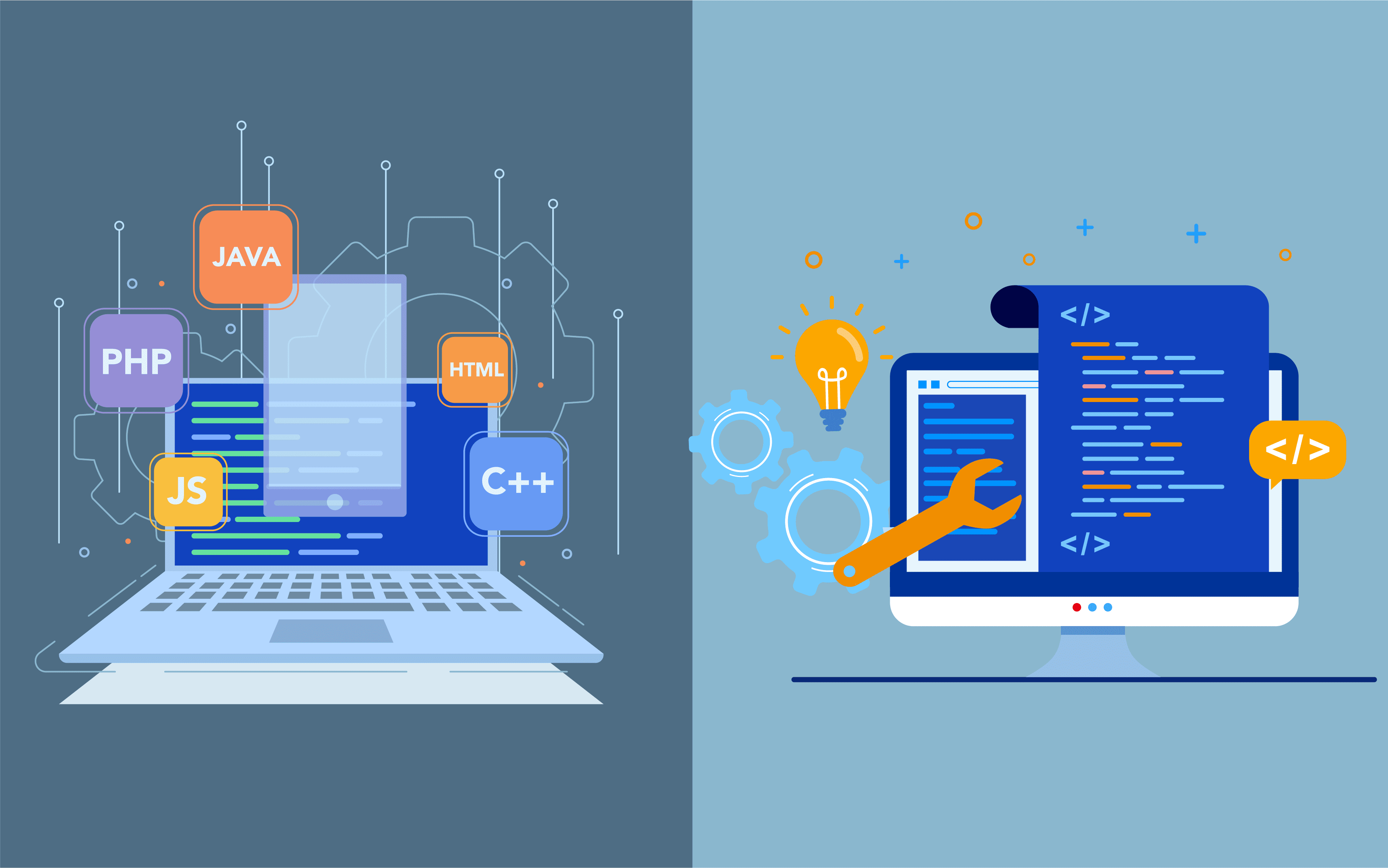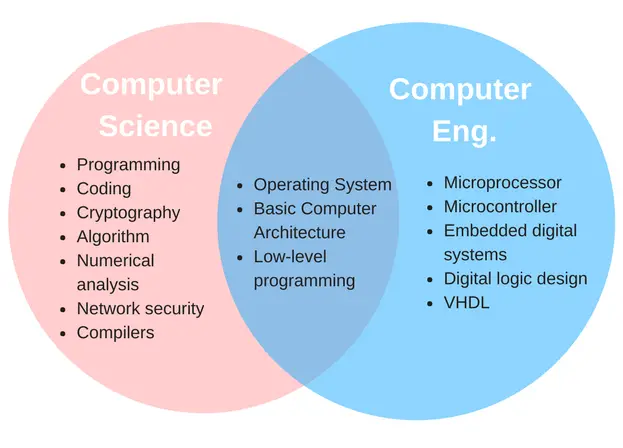
Computer Engineering vs Computer Science (2024).
Are you torn between pursuing a degree in computer engineering or computer science? You’re not alone! These two fields, while closely related, have distinct focuses and career paths. Understanding the differences can help you make an informed decision about your future.
Computer Engineering
Computer engineering combines electrical engineering and computer science. It focuses on designing and building computer hardware and integrating software with hardware systems.

Core Areas of Study
– Circuit Design
– Microprocessors
– Embedded Systems
– Digital Logic Design
Typical Curriculum
– Introduction to Electrical Engineering
– Computer Architecture
– Signal Processing
– VLSI Design
Skills Acquired
– Hardware Design
– Software Integration
– Problem-Solving
– Analytical Thinking
Computer Science
Computer science is the study of algorithms, data structures, and the principles of software design and development. It focuses more on software than hardware.
Core Areas of Study
– Programming Languages
– Data Structures and Algorithms
– Operating Systems
– Artificial Intelligence
Typical Curriculum
– Introduction to Programming
– Data Structures
– Software Engineering
– Database Management
Skills Acquired
– Software Development
– Analytical and Logical Reasoning
– Problem-Solving
– Project Management

Key Differences Between Computer Engineering and Computer Science
Focus and Scope
– Computer Engineering: Emphasis on hardware and software integration.
– Computer Science: Focus on software and computational theory.
Practical Applications
– Computer Engineering: Building hardware systems, embedded systems, robotics.
– Computer Science: Developing software applications, databases, and AI systems.
Career Paths
– Computer Engineering: Hardware Engineer, Embedded Systems Developer, Robotics Engineer.
– Computer Science: Software Developer, Data Scientist, AI Specialist.
Educational Pathways
Degrees and Certifications
– Computer Engineering: Bachelor’s in Computer Engineering, Master’s in Electrical Engineering.
– Computer Science: Bachelor’s in Computer Science, Master’s in Data Science.
Key Courses and Specializations
– Computer Engineering: Embedded Systems, Digital Circuit Design.
– Computer Science: Machine Learning, Cybersecurity.
Importance of Internships and Practical Experience
Both fields highly value practical experience and internships, which provide hands-on learning and industry connections.
Career Opportunities in Computer Engineering
ob Roles
– Hardware Engineer
– Embedded Systems Developer
– Robotics Engineer
Industry Demand
High demand in sectors like electronics, automotive, and aerospace.
Salary Expectations
Salaries vary, but hardware engineers typically earn competitive wages due to specialized skills.

Career Opportunities in Computer Science
Job Roles
– Software Developer
– Data Scientist
– AI Specialist
Industry Demand
Strong demand in tech, finance, healthcare, and more.
Salary Expectations
Software developers and data scientists often enjoy high salaries and excellent job growth prospects.
While distinct, these fields often overlap. Many projects require both hardware and software expertise, fostering collaboration between computer engineers and computer scientists.
Interdisciplinary Nature
Projects like IoT devices and robotics benefit from the skills of both computer engineers and computer scientists.
Working together on innovative solutions, these professionals push technological boundaries.
Technological Innovations
Advances in AI, machine learning, and hardware-software integration showcase the synergy between these fields.
Choosing the Right Path
Assessing Personal Interests and Strengths
Consider whether you prefer working with hardware or software, and your interests in engineering principles versus computational theory.
Think about the type of projects and industries you want to work in and the skills you’ll need.
Industry Trends
Stay informed about trends and demands in the tech industry to align your education and career goals.
Real-World Applications of Computer Engineering
Hardware Development
Creating new and improved hardware components for various devices.
Embedded Systems
Designing systems that integrate hardware and software for specific functions.
Robotics and Automation
Developing robotic systems for manufacturing, healthcare, and more.
Real-World Applications of Computer Science
Software Development
Building applications and systems that drive modern technology.
Data Science and Analytics
Analyzing large datasets to extract valuable insights and inform decisions.
Artificial Intelligence
Developing intelligent systems that can perform tasks requiring human intelligence.
Future Trends in Computer Engineering
Emerging Technologies
Exploring advancements in quantum computing, nanotechnology, and more.
Ongoing R&D efforts to push the limits of hardware capabilities.
Impact on Society
Innovations in hardware impact everything from healthcare to entertainment.
Future Trends in Computer Science
Advances in Machine Learning
Continued development of algorithms that improve data processing and decision-making.

Cybersecurity
Enhancing measures to protect data and systems from cyber threats.
Ethical Considerations
Addressing the ethical implications of AI and data privacy.
Advantages and Disadvantages of Each Field
Pros and Cons of Computer Engineering
– Pros: Diverse career opportunities, high demand, impactful work.
– Cons: Requires strong foundation in math and physics, can be hardware-centric.
Pros and Cons of Computer Science
– Pros: Versatile skills, broad job market, innovative work.
– Cons: A rapidly changing field requires continuous learning, and can be competitive.
Choosing between computer engineering and computer science depends on your interests, strengths, and career goals. Both fields offer exciting opportunities and the chance to be at the forefront of technological innovation. Consider what excites you most and where you see yourself making the most impact.
FAQs
1. What is the main difference between computer engineering and computer science?
– Computer engineering focuses on hardware and software integration, while computer science emphasizes software development and computational theory.
2. Can I switch from computer science to computer engineering (or vice versa)?
– Yes, many skills are transferable, but additional coursework may be required to cover gaps in knowledge.
3. Which field has better job prospects?
– Both fields have strong job prospects, but demand can vary by industry and location.
4. Do I need a graduate degree to succeed in either field?
– A bachelor’s degree is often sufficient, but a graduate degree can open up advanced career opportunities.
5. How do industry certifications affect career opportunities?
– Certifications can enhance your resume and demonstrate specialized knowledge, making you more competitive in the job market.








